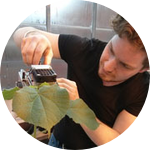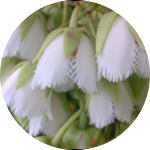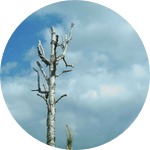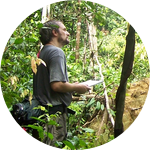About This Project
The tropical forests of Mauritius, once home to the famous Dodo, currently face another threat of multiple extinctions due to the invasion of strawberry guava which inhibits the growth of native plants by producing allelochemicals. Biochar (charcoal used as soil amendment) can absorb the allelochemicals given off by strawberry guava. We plan to conduct a field study in Mauritius to determine whether biochar can reduce the inhibitory effects of strawberry guava on endangered endemic plants.
Ask the Scientists
Join The DiscussionWhat is the context of this research?
Mauritius is home to 273 endemic plant species of which 105 are critically endangered and 44 are endangered. Only 1% of the forest remnants are occupied by native vegetation. Strawberry guava (Psidium cattleianum) dominates the upland forests of Mauritius by suppressing the growth of native plants. The success of strawberry guava has been suggested to be partially caused by the release of allelochemicals (secondary metabolites) that inhibit germination and growth of other plants. An experiment conducted at the University of Toronto confirmed this hypothesis for the first time. During the experiment, biochar significantly reduced the inhibitory effects of strawberry guava. We want to test the long-term effects of biochar on sorption of allelochemicals in the soil through the field study.
What is the significance of this project?
The native forests of Mauritius provide important ecological services such as recycling rainfall, preventing soil erosion and reducing runoff that can cause floods in areas downstream. Strawberry guava lowers the groundwater level and reduces water available to the native forests and local communities. Strawberry guava also threatens biodiversity in Mauritius. Several endemic flora and fauna face extinction due to invasion of strawberry guava and loss of habitat.
Biochar has the potential to increase biodiversity and restore ecological services by reducing invasion by strawberry guava and promoting the regeneration of native trees. Biochar can also combat climate change by promoting native trees with higher carbon sequestration capacity than the shrubby strawberry guava.
What are the goals of the project?
Our goal is to increase the biodiversity across 16 plots in Black River Gorges National Park by planting seedlings of rare endemic species and using biochar to remove the competitive advantage of strawberry guava over the seedlings.
Our project will increase carbon sequestration in the native forests by promoting the dominance of endemic trees (particularly hardwoods) with a higher carbon sequestration capacity than strawberry guava.
It costs 3000 USD to remove strawberry guava per hectare of forest. Biochar can reduce these costs significantly by decreasing the frequency of manual tending.
We also want to engage the public, particularly children and teenagers, in the field study to expose them to the field of scientific research and the importance of protecting native forests.
Budget
We do not have any external source of funding for this research project. We will partially fund it from our personal budget but we need the $2500 requested to reach a total amount of approximately $4500 required to start the project.
I plan to fly to Mauritius to start this project in November - December before the rainy season begins so that the planted seedlings will have optimal growing conditions.
Since biochar is not commercially produced in Mauritius, we will need a conical kiln to create a low-tech pyrolysis system. We will need an infrared thermometer to monitor the pyrolysis temperature when making biochar. We will purchase seedlings of rare endemic species from local nurseries in Mauritius.
We would like to include more endemic plant species in our experiment. This will give us a better idea of which endemic plants are more (or less) vulnerable and can potentially help guide the management and restoration of Mauritian forests in the future.
Endorsed by
Meet the Team
Leeladarshini Sujeeun
I recently graduated from the Forest Conservation program at the University of Toronto. I worked with my supervisor Sean Thomas to do exciting new research in ecological restoration using biochar, particularly with invasive plants.
For my undergraduate thesis project, I had the amazing opportunity to investigate the potential of biochar to control the worst invasive plant (Psidium cattleianum) in the tropical paradise island Mauritius, where I was born and raised. I aim to pursue this avenue well into the future in an attempt to restore native tropical forests that have been degraded by invasive plants. I am also interested in the application of biochar as a means to mitigate climate change and restore highly acidic mining sites.
I aim to gain enough experience in the management and restoration of forest ecosystems to be able to establish a forest conservation foundation in Mauritius in the future. Together with locals and conservation scientists, we can protect the remaining endemic flora and fauna that are on the brink of extinction.
Sean Thomas
Driven by a curiosity about ecosystems and concern for our planet, I have been an active researcher on forest carbon processes and the comparative biology of trees for some 25 years. Recently my lab has taken a turn to the “dark side” of forest ecology – namely the study of charcoal in forest soils, either added as an amendment (“biochar”) or input through natural fires. My research group is particularly interested in char properties, distribution, their impacts on soil organisms, processes, and forest productivity, and the use of chars in forest restoration. I've worked extensively in developing countries ranging from SE Asia to Africa and Latin America.
Additional Information
To all you lovely backers – Thank you for helping us reach our goal! We will send you all a postcard and share our amazing adventures with you, but most importantly we will keep you up-to-date with the results of the experiment.
To show you how much we appreciate your support for this project, we will reward you with the following gifts for contributing generously to our project:
$20 or more: We will name a rare endemic seedling after you and keep you posted as we monitor the growth of the seedling. Once we have confirmed the list of species that we’ll be planting, you can choose your favorite species and we’ll name the seedling after you! We will also send you a souvenir keychain from Mauritius.
$50 or more: You can adopt an entire plot and become the proud parent of 10 endemic seedlings! We will name the plot after you and you can name each seedling. We will send you photos of the endemic seedlings and wildlife that may visit your plot. We will also send you a step-by-step DIY (Do-It-Yourself) guide for the production of biochar so you make your own biochar in your backyard and watch your garden plants become healthier than ever!
$100 or more: Even though you cannot be physically present to help us set up our experiment, we do not want you to miss out on the memorable moments and adventures of our journey in Mauritius. We will send you a scrapbook of endemic species in Mauritius that you are helping to protect. In addition, we will send you a souvenir T-shirt from Mauritius. We’ll also name an entire plot after you and send you a bowl sustainably made out of coconut shells and crafted by a local artisan.
Project Backers
- 22Backers
- 102%Funded
- $2,563Total Donations
- $116.50Average Donation




